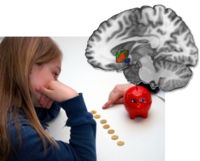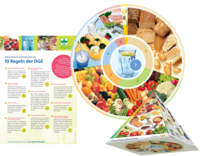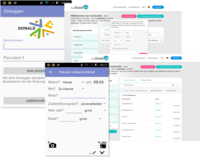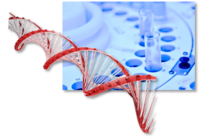In its 1st funding period (2015 - 2018), DietBB established a solid research infrastructure, with effective communication channels, interactions, and capacity building activities, and generated evidence concerning associations between diet and cognitive outcomes using human research approaches.
During the 2nd funding period, the cluster will refine its research questions and exploit the resources established during the 1st funding period according to the hypothesized links of diet through the immune system, specific metabolic processes or the gut microbiome on brain health. To ensure the long-term sustainability of DietBB, cluster partners plan measures such as the assurance of long-term data use and access.
Thematic Area 1: Development of novel methods and technologies in nutritional and behavioral sciences
In collaboration with the University of Leeds, UK, a German version of the web-based myfood24 was developed. The instrument used the most current version of the German reference food table BLS (Bundeslebensmittelschlüssel) and LEBTAB, the UB inhouse database. Moreover a concept for the conduct of the feasibility study was devised. NutriDiary was implemented successfully in the DONALD Study. The smartphone App is now available for the Android and iPhone (iOS) operating systems. Participants of the DONALD Study can choose between the App and the conventional method (paper-and-pencil-version) to record their dietary intake. Also the study was supposed to validate the app using 24-h urine biomarkers.
Dietary pattern analysis was conducted and derived dietary patterns explaining variation in selected biomarkers. For this purpose blood samples from participants of the Rhineland Study were examined in collaboration with other DietBB partners. To facilitate dietary pattern analyses, standard operating procedures (SOP) were being developed to harmonize dietary pattern analysis across the DietBB cohort studies.
Link to Thematic Area 1: Methods
Thematic Area 2: Population-based studies of food intake and food patterns, and brain structure and function across the life-span
The main objective of TA2 was to provide a backbone to the DietBB investigations into diet-brain-associations. For this purpose WP2.1 developed, piloted, and implemented a digital version of the Food Frequency Questionnaire (FFQ) and a 24h Food List. Also a state-of-the-art single nucleotide polymorphism (SNP) array testing to allow initial genomic analyses and a protocol for state-of-the-art metabolomics analysis were set up in close collaboration with TA4 and TA1.
In coordination with TA1 we decided to focus on analysis of a priori analyses of dietary patterns in WP2.2. The methodologies for a priori analyses of dietary patterns have been selected. WP2.3 chose the Culture Fair Intelligence Test (CFT) as a measure of fluid intelligence. The assessment of fluid intelligence based on the CFT in DONALD participants aged 5-10 years and 15-18 years was commenced and is ongoing for a younger age group. Furthermore a protocol for state-of-the-art abdominal magnetic resonance imaging (MRI) was developed, tested, and implemented. A tool to allow initial semi-quantitative analysis of the MRI data was evolved as well, using non-DietBB funds. This tool will be relevant in and beyond DietBB.
In WP2.5 the focus was on risk of cognitive decline and dementia. Analyses of data from the AgeCoDe multi-center cohort study were conducted. It could be demonstrated, that a higher intake of coffee, fruit, and vegetables was associated with a less pronounced decline in memory function over a 10 year period of follow up. In addition the analyses showed, low levels of vitamin E were associated with the presence of Alzheimer´s disease (AD) dementia over 7-year period of follow up, whereas low levels of vitamin D were associated with an increased risk of dementia. At last a higher blood level of docosahexaenoic acid (DHA) was associated with a lower risk of incident AD.
WP2.6 collected FFQ data, longitudinal brain imaging data and cognitive assessments from more than 500 non-demented elderly individuals. Also fatty acid measurements in blood plasma will be available for up to 1000 DELCODE participants, which include subjects with dementia and without data from the FFQ.
Link to Thematic Area 2: Cohorts
Thematic Area 3: Dietary intervention studies: Influence of food patterns and polyphenol availability on systemic inflammation and risk markers for neurodegenerative diseases
A bolus intervention study to investigate the acute effects on postprandial metabolic events of three different meals representing different dietary patterns was performed in WP3.1.
The nutritional physiology group analyzed potential genotype-specific differences in metabolic response in the risk population. Thereby all three meals showed postprandial hyperglycemia, hyperinsulinemia, hyperlipidemia and increased low-grade inflammation. But the meals differ in the glycemic and the insulinemic response as well as in the increase of serum triglycerides. Initial data from the bolus intervention study were presented at the ESPEN congress and further analyses were implemented.
In cooperation with WP2.5 measurements of the fatty acid composition of serum phospholipids from samples of the AgeCoDe study were performed. Also WP3.1 has commenced pre-studies for the collaboration with the Rhineland study. In collaboration with the Platform for Single Cell Genomics and Epigenomics a pilot study in young, healthy, normal-weight men and individuals with metabolic syndrome to determine the feasibility of measuring changes in phenotype and transcriptional regulation of innate immune cells following dietary challenge was conducted. An increased inflammatory response was observed in individuals with metabolic syndrome after a WDHF meal. Another postprandial study to investigate the effects of walking on postprandial events and neuropsychological parameters in elderly subjects with a cardiometabolic- and neurodegenerative disease risk phenotype will be the basis for a long-term intervention study in the second funding period.
WP3.2 investigated the bioavailability of anthocyanins as affected by the food matrix and characterized metabolites in blood/urine. In collaboration with the Nutritional Physiology Group, a pilot study to characterize the systemic availability of anthocyanins from bilberry fruits and derived products was performed. The study had a randomized crossover design and involved healthy, normal-weight participants. Bilberries were administered as fruits, juice, fruit puree or fruit powder. At baseline and in regular intervals blood samples and the 24h urine were collected.
Furthermore methods for the work-up of plasma and urine samples for phenolic acid analysis and for the simultaneous determination of nine different flavonoids were developed. WP3.2 refined also the methods to allow for detection of low-abundant compounds in plasma samples from the Rhineland Study in collaboration with TA2.
Link to Thematic Area 3: Interventions
Thematic Area 4: Genetic and epigenetics factors as a biological link between food intake and cognition/neurodegeneration
A unique German registry of 40 twin pairs with twin-to-twin transfusion syndrome (TTTS) was investigated. Data of 80 individuals were received and genome-wide genotyping and DNA methylation analysis were performed. WP4.1 also evaluated cognitive and behavioural characteristics with different instruments. Currently an analysis in order to identify genetic and epigenetic factors that confer the effect of prenatal nutritional status on cognitive performance and behavior is performed.
WP4.2 established a DNA biobank of >700 samples from the DONALD cohort and genome-wide genotyping and methylation analysis have been completed for a total of 200 individuals. TA 2 has provided nutritional- and cognitive data from the DONALD cohort. These data are used to explore the interaction between genetic and epigenetic factors and nutrition during childhood and adolescence.
In the cohort of the Rhineland Study blood samples were collected, as well as genetic data of 2000 participants by WP4.3. Furthermore genome-wide DNA methylation analysis in 113 individuals with incident AD and 189 dementia-free controls were performed in the AgeCoDe cohort in WP4.4. The AgeCoDe participants were dementia-free at baseline.
In WP4.5 genetic data were analyzed, which were generated in TA4. The aim was, to determine the contribution of particular genes/pathways to outcomes such as cognition and neurodegeneration and to examine how this is influenced by nutrition. Therefore genetic risk scores (GRS) of nutrition-related diseases/traits and cognitive/neurodegenerative traits were calculated and applied to the AD genetic data obtained in the AgeCoDe cohort. No association was found between the BMI GRS and AD. Further GRS were generated using data of genome-wide association studies (GWAS) results for nutrition-related and cognitive traits. Currently the GRS is applied to genetic data from the different DietBB cohorts.
Moreover the interplay between nutrition and epigenetic changes was analyzed. Therefore WP4.6 used the generated several epigenetic data sets of WP4.1 to WP4.4.
The implementation of bioinformatic and biostatistic approaches for data generated generated GRS using a range of GWAS data sets has been completed. WP4.7 performed a GWAS of general cognitive function (G-Factor) using genetic data from the AgeCoDe sample. The results of were included in a meta-analysis of data from more than 280.000 individuals. In addition a novel technique to identify associations between DNA methylation, clinical variables, and lifestyle factors in epigenome-wide association studies was developed.
Link to Thematic Area 4: Genetics

Thematic Area 5: Individual and contextual factors as determinants of food choices – from personality to interventions
Personality traits in subjects from the DONALD and Rhineland study were assessed to investigate their association with dietary patterns and health outcomes. About 160 children have been assessed using measures of impulsivity, risk-taking behavior, and social preferences and initial analyses have been performed. WP5.1 also developed a questionnaire module on personality and risk preferences and integrated the module into the core study protocol of the Rhineland study.
WP5.2 focused on contextual factors with a potential influence on the valuation, perception, and consumption of foods and investigated, how specific cues (e.g., packaging design, nutritional information and food labels) influence food valuation and decision-making processes. Behavioral and functional MRI experiments, using eye-tracking, were made. These experiments showed a strong dependence between food valuation or rather food choice and how food items are presented at the time of their selection. A hypothesis is that the attention impacts the weighting of opposing attributes.
A field study with 150 participants was implemented in WP5.3. It was investigated, how disentangling the time-point of choice from the actual consumption of food may increase the weighting of health-attributes during food-selection and thus decrease calorific intake. The recruitment was conducted in the university cafeterias of the University of Bonn and the University of applied Sciences Bonn-Rhein-Sieg. Participants were instructed to choose their meals for the upcoming week in advance vs. a direct choice at the time they wanted to consume the food. Analyses of the effect of the intervention on consumptions were completed
Link to Thematic Area 5: Personality factors

Thematic Area 6: Communication of individualized dietary recommendations and healthy food choices
WP6.1 established a communication network, using existing structures, and developed publications (f. e. press releases) and website content. They were also creating a Corporate design manual, flyer, and a key visual. At congresses promotional items were distributed, for example at the DGE congress. A concept for DietBB communication was developed, but it was assessed as not optimal. This concept had to be optimized for the second funding period.
Furthermore WP6.2 made a literature research and review of international food-based dietary guidelines (FBDG). The level of awareness of the German FBDG was evaluated in a collective of about 1800 German adults. The best known recommendation was about a high consumption of fruits and vegetables, and 14% were aware of the “10 rules of the DGE”. For the further development of communication strategies an expert workshop was arranged in Bonn, December 2016. The participants of the workshop represented various scientific disciplines, nutritional counseling and the food industry. Through simply messages and the use of digital media the gap between scientific evidence and acceptance and feasibility in daily life will supposed to be closed. Another result of the workshop was ongoing scientific supervision of the project by two experts (sociology, communication science).
Link to Thematic Area 6: Communication










